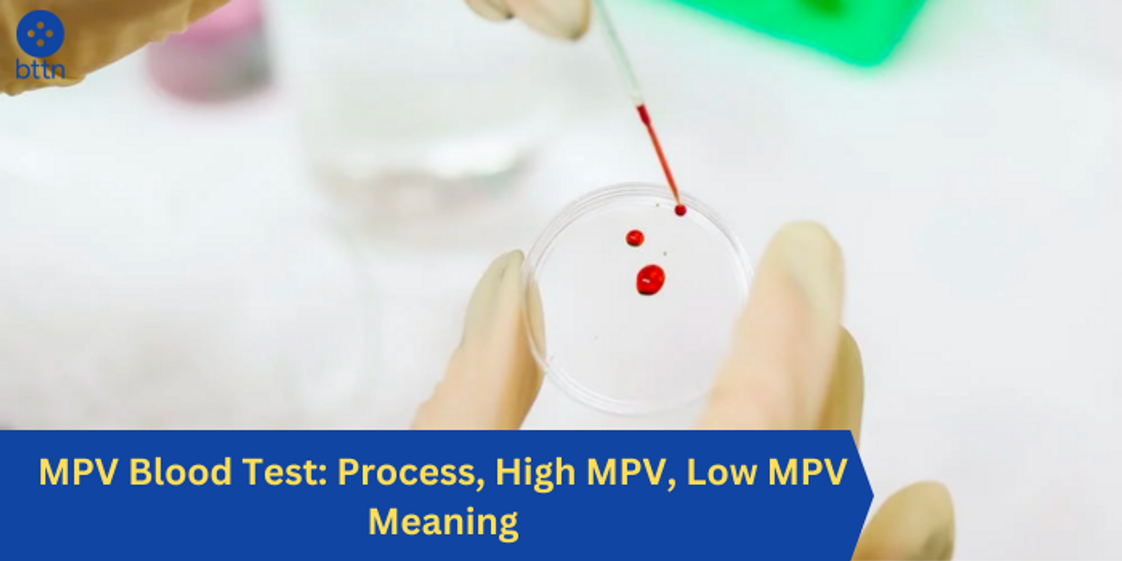
MPV Blood Test: What You Need to Know About Your Results
Posted by Pankaj Dhiman on Nov 3rd 2023
MPV Blood Test: Process, High MPV, Low MPV Meaning
When it comes to monitoring your health, blood tests play a crucial role in providing valuable insights into your well-being. One such blood test that you might encounter is the Mean Platelet Volume (MPV) test. If you're curious about what MPV is, how the testing process works, and what the results could mean for your health, you've come to the right place.
In this comprehensive guide, we'll take a closer look at MPV blood tests, from understanding the testing process to deciphering the implications of both high and low MPV results. So, let's dive in and shed light on this essential aspect of your health.
What is MPV?
MPV, or Mean Platelet Volume, is a component of a standard complete blood count (CBC) test. Platelets are tiny cell fragments in your blood that play a critical role in clotting, preventing excessive bleeding, and promoting wound healing. MPV measures the average size of your platelets.
The MPV value is reported in femtoliters (fL), which is a unit of measurement for volume. A typical MPV range falls between 7.4 fL and 10.4 fL, but the reference range can vary slightly from one laboratory to another.
Testing Process
Getting an MPV blood test is a straightforward process. It typically involves the following steps:
- Blood Collection: A healthcare professional will draw a sample of your blood using a needle. This is usually done in a clinic, hospital, or a diagnostic center.
- Lab Analysis: The blood sample is sent to a laboratory, where it is analyzed using specialized equipment. This equipment measures the size of your platelets and calculates the MPV value.
- Reporting Results: Once the analysis is complete, your MPV result will be reported, usually within a few days. You'll receive your results in femtoliters (fL).
High MPV Meaning
A high MPV level can indicate various health conditions and potential concerns. While a slightly elevated MPV value may not be a cause for immediate alarm, it is essential to discuss your results with a healthcare professional for a comprehensive evaluation. Here are some reasons for a high MPV:
1. Cancer
One of the most concerning associations with a high MPV is its potential link to cancer. Elevated MPV levels can be a marker of certain types of cancer, such as lung cancer, colon cancer, or ovarian cancer. However, it's important to note that a high MPV alone is not a definitive cancer diagnosis. Further tests and evaluations are needed to confirm the presence of cancer.
2. Other Causes
Apart from cancer, several other factors can contribute to a high MPV reading. These include:
- Infections: Inflammatory conditions and infections can elevate MPV levels.
- Bone Marrow Disorders: Certain bone marrow disorders, such as myeloproliferative disorders, can affect platelet production and lead to an increase in MPV.
- Medications: Some medications, like aspirin and nonsteroidal anti-inflammatory drugs (NSAIDs), can affect platelet size and result in a higher MPV.
- Vitamin B12 Deficiency: Low levels of vitamin B12 can affect platelet production and result in a high MPV.
If your MPV comes back high, your healthcare provider will likely perform additional tests to pinpoint the underlying cause.
Low MPV Meaning
Conversely, a low MPV value can also provide valuable insights into your health. While a slightly low MPV level may not necessarily indicate a severe issue, it's still crucial to discuss your results with a medical professional for proper evaluation. Here are some reasons for a low MPV:
1. Bone Marrow Disorders
A low MPV can be associated with certain bone marrow disorders, such as aplastic anemia or myelodysplastic syndrome (MDS). These disorders can impair the production of platelets, leading to a decrease in MPV.
2. Immune System Disorders
Conditions that affect your immune system, like lupus or rheumatoid arthritis, can cause a drop in MPV levels. These conditions may affect platelet function and size.
3. Medications
Some medications, such as chemotherapy drugs, can lead to a decrease in MPV levels.
4. Chronic Liver Disease
Liver disease can impact various aspects of your blood, including platelet size. A low MPV might be a sign of liver-related issues.
In cases of a low MPV, additional tests and evaluations are usually required to identify the specific cause and determine the appropriate course of action.
The Bottom Line
Your MPV blood test results can offer valuable insights into your health, from potential cancer markers to bone marrow disorders and immune system conditions. However, it's essential to remember that an MPV test is just one piece of the puzzle. A single elevated or decreased MPV value should not be taken as a definitive diagnosis.
If your MPV results are outside the normal range, it's crucial to consult with a healthcare professional who can perform additional tests and evaluations to determine the underlying cause. They will work with you to develop a personalized healthcare plan tailored to your specific needs.
Remember, regular health check-ups, including blood tests like the MPV test, are a proactive way to monitor your well-being and catch potential health issues early. Your health is precious, so take the initiative to stay informed and seek professional guidance when needed.
If you are concerned about your health or want to monitor your MPV levels regularly, you can consider using Blood Test Kits from Bttn, a reliable source for at-home blood testing kits. These kits provide a convenient way to track your health in the comfort of your own home.
In conclusion, the MPV blood test is a valuable tool in assessing your health, and understanding your results can empower you to take control of your well-being. Remember, while a high or low MPV may raise concerns, it's essential to work closely with a healthcare provider to address any potential issues and develop a suitable plan for your overall health and well-being.
